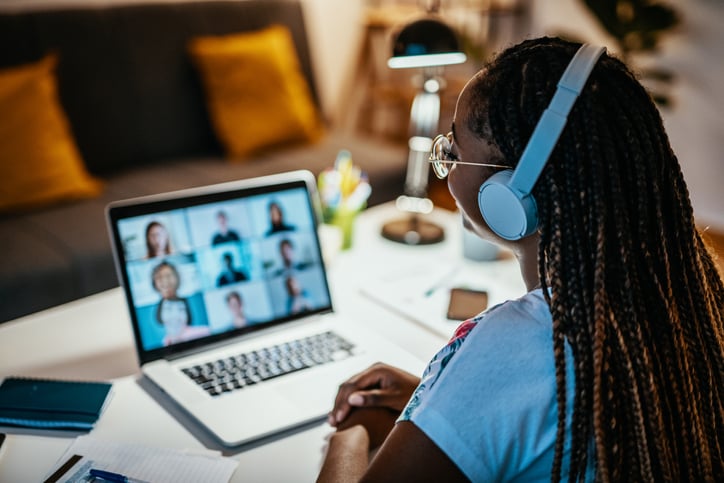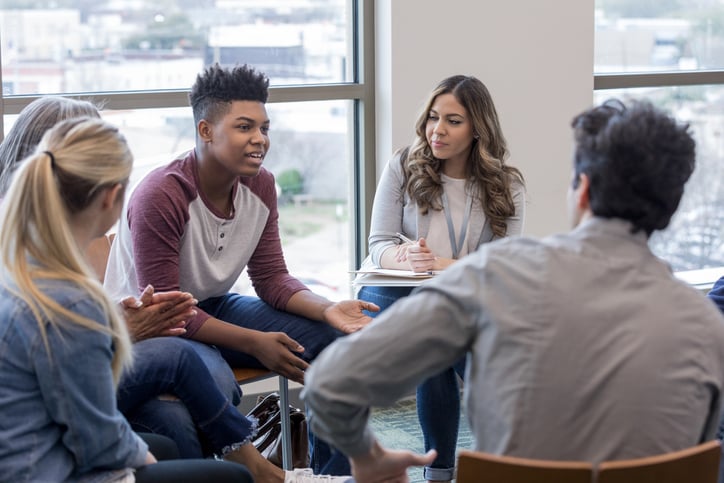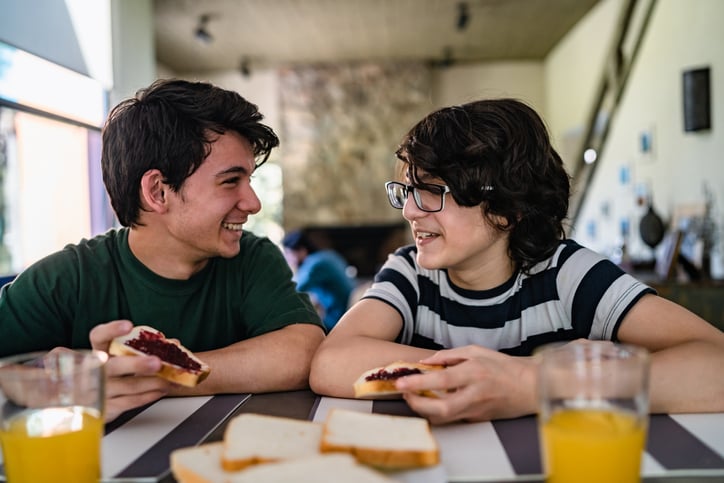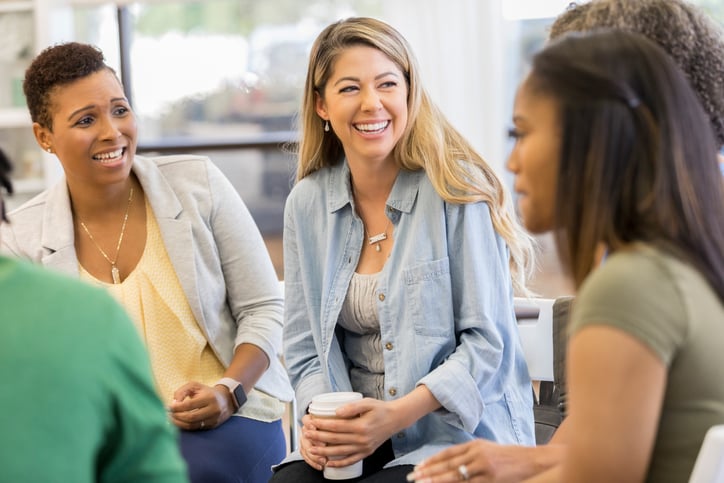Support Groups for Autistic* Children, Teens, Young Adults and Parents
Support groups and social clubs for children, teens, and young adults with autism provide a safe environment for people with shared experiences to connect and participate in a supportive, understanding community. No matter what your child's or student’s needs are, there are similar families, groups, and individuals out there. Support groups and social clubs can provide opportunities for people with autism to practice necessary, functional skills in a safe group and can also provide a safe place to share experiences about being autistic with others who understand.
Parents, families, and children with autism can greatly benefit from autism support groups. There are many different kinds of groups.
- Professional-led groups by psychologists, social workers, or educators are typically connected with autism advocacy groups and can serve both children and parents together or separately.
- Education support groups can help people learn more about autism-related issues. These can be led by professionals or peers and are typically for families or parents.
- Social skills development and social groups are typically designed to serve a specific age range and skill level for autistic children, teens, and young adults.
In Person vs. Online
There are a variety of in-person and online groups. Finding an in-person support group in your community can be as simple as Googling “autism support group + your state/city.” Need a less formal, more flexible option? Online support groups are easy to drop in and out of and you can connect with others from across the country. Facebook has thousands of groups created by teens and adults with autism, parents of children with autism, and professionals. Facebook groups are free and easy to join with an account. Simply search “autism” under their groups tab, and you can find the group description that suits your needs.
In-person support groups typically ensure confidentiality in terms of sharing what goes on in the group. Online confidentiality is not always guaranteed. Whether posting in a public or private forum, a post is on the internet forever. It is important to consider your privacy and your child’s privacy when posting. For example, if you are a parent seeking toileting advice for your child, an in-person group is a confidential, private space to have that conversation. Online, you must be more mindful of who can access your post and think about your child’s right to privacy. Keep intimate details and identifying information like names or pictures out of online groups.
In-person groups provide ways to more strongly connect to others. For parents, these connections can be invaluable in sharing experiences and recommendations about schools, therapy, troubleshooting problem behaviors, or simply receiving validation and support from others going through similar experiences. For children and teens, in-person groups can provide valuable opportunities for practicing social skills and making friends.

Benefits of Support Groups and Social Clubs
For children, teens, and young adults with autism, sharing personal experiences in support groups and social club settings is a safe place to be yourself. Often, these groups are led by advocates, speech-language pathologists, occupational therapists, educators, or other professionals who work with people on the spectrum, or autistic individuals themselves. Benefits for participating in support groups or social clubs include support in shared experiences, positive peer relationships, practicing functional skills (social skills, collaboration, and problem-solving), and building self-esteem.
Support groups are designed for people with autism to connect and discuss their personal experiences with being on the spectrum. Support groups offer a safe space for individuals to be fully honest with their frustrations and explore their feelings with people who understand their experiences best. Support groups can be a great setting to seek advice and validation, and feel empowered.
Social clubs are often more structured than support groups. This is a setting for people with autism to practice social skills and connect with others on the spectrum. Social clubs support improved communication, social skills, and friendships.
Many people with autism have specific, specialized interests or affinities. Is there a specific television show your child is interested in? Do you know someone on the spectrum who has extensive knowledge about a subject? A video game aficionado? Finding a group that caters to an individual’s specific interest can further help them find an inclusive, supportive network. These are often referred to as “Interest Groups” and are not always specific to autism.
Participating in a support group or social club can be a really positive experience for people with autism. It helps to build confidence and functional communication skills and increases children's and teens’ sense of self-worth. For parents, support groups can provide much-needed help and connection and provide shared strategies and useful pointers and information about local services.
Where to Find an Organized Support Group or Social Club in Your Area
Organized support groups and social clubs are all around the country. It’s important to find an age-appropriate group for your child, teen, or young adult to join. Finding a setting that works best for your child starts with identifying what might be most rewarding and beneficial for them: Are they looking for support to process their experiences, is the purpose to work on making connections and improving social skills and relationship-building skills? Or is it more important to provide them with an outlet to explore and discuss their special interests or simply for recreational purposes? It is important to find a group that caters to different levels of independence: Do they need professional support? Does your child benefit better from a larger group setting or would they be more apt to thrive in a smaller group or one with adults present?
Many communities, cities, and states offer groups and clubs. Local autism networks and organizations provide adults, family, friends, and professionals with resources to support individuals with autism. A simple search of your closest town or city with “Autism Network” will provide a number of resources, groups, and clubs. In evaluating these groups ask other parents or professionals you are connected with in the autism community for their suggestions or experiences.
Online clubs can be a safe place for people with autism to connect virtually and work on social skills especially if they feel anxious about joining in person. Online groups may cater to specific interests, offer support groups, or more casual events like a movie-watch party. Your local recreation department or library may offer after-school or community-based clubs that cater to specific interests. These structured settings and activities can be a great spot for individuals with autism to meet others with similar interests.
The Interagency Autism Coordinating Committee (IACC) is a U.S. federal advisory panel within the Department of Health and Human Services. Explore their resource page to find specific services and programs within your state.

Professionally-Run Groups
There are hundreds of professionally run autism groups led by Counselors, Psychologists, Therapists, Social Workers, and educators. Psychology Today’s autism groups are a good place to start exploring. Many professionally run groups conduct in-person meetings, telehealth meetings, and online groups. Explore groups for autistic adults or young adults transitioning into adulthood, groups for parents and caregivers, and for sibling support. Groups run by licensed professionals may include a fee but are also more likely to provide more services and support. On Psychology Today, you can sort through in-person or online groups, specific licensures, costs, and group descriptions to find your match.
The Asperger/Autism Network (AANE) helps people on the autism spectrum and their families with information, education, community, support, and advocacy. While the AANE is based in Massachusetts and New York, they work with autism-related organizations throughout the world. Explore AANE’s website to find free events, online support groups, and resources for adults, family and friends, and professional connections. AANE offers calls and emails with their team for free to help direct you toward resources that best suit your needs. From there, you can explore their free and fee-based support groups, discussion forums, and social activities and events. No matter your age or what your connection to the autism community is, AANE has lots of resources to support your needs.

Start Your Own Group
If you are having trouble finding a group that meets your or your child’s specific needs, consider forming your own group.
Susan Kleiman and Dana DeRuvo are an example of two mothers who did just that: started their own network. Based in New York, they were having challenges navigating lawyers, pediatricians, programs, and finding needed advice to support their children with autism. Together, they started a simple Facebook forum called “Special Moms.” Since starting this Facebook group, it has flourished into an international network of a few thousand followers and is now a website that organizes databases for professionals specializing in autism. DeRuvo says, “There was nothing centralized on the internet for mothers to be educated, empowered, and supported all in one place.” The group’s resources now help thousands of families.
Starting your own group can be as simple as starting a Facebook forum like Kleinman and DeRuvo did. Or, you can contact your local recreation department and explore possibilities for in-person groups. In designing your own support group or network, consider the following:
- What type of structure would serve you best? Do you want an in-person group? Or would an online group better serve your purposes?
- What is the goal of your group? Are you looking for advice and support, a way to share resources and information, or a group designed specifically for your autistic child to practice social skills and build friendships?
- Who should be involved? Maybe you want to create a community-based social group for you and your child to connect with. Or a place to discuss effective treatment options for your child with other parents.
- For in-person groups, you may be able to use the public library or community center to meet. Or consider taking turns hosting at people’s houses or even hiring a professional to help lead your group.
You may find that whatever type of group you join or start you will want to re-evaluate your and your child’s needs over time. As your child gets older they may have different needs and challenges and it is important to step back and think about whether a new type of group might make sense to join.
We hope you enjoyed the information in this article. STAGES® Learning also offers free downloadable resources to support teaching and learning with individuals with autism. Start with our free Picture Noun Cards and see our collection of other downloadable resources here!
This article is based on the following research and online resources:
https://theautismproject.org/parents-families/programs-resources/social-groups
https://www.aane.org/resources/adults/social-groups/
https://iacc.hhs.gov/resources/organizations/states/
https://www.autismparentingmagazine.com/autism-support-groups-for-parents-families-children/
https://www.psychologytoday.com/us/groups?search=autism
https://www.autismparentingmagazine.com/autism-support-groups-for-parents-families-children/





